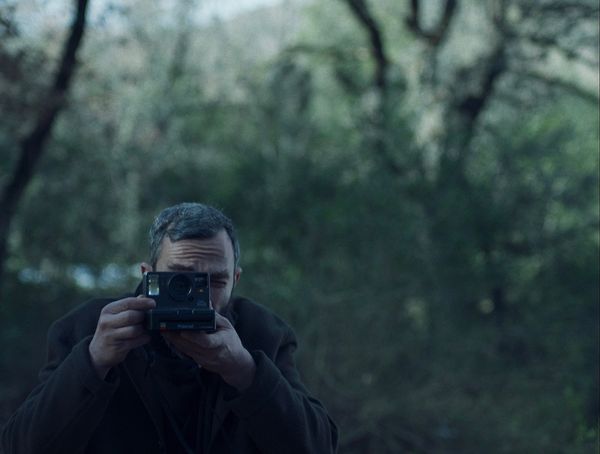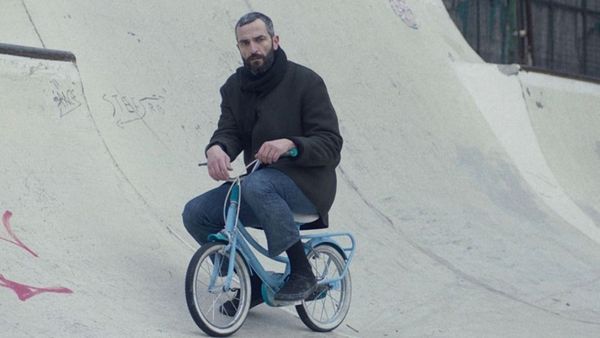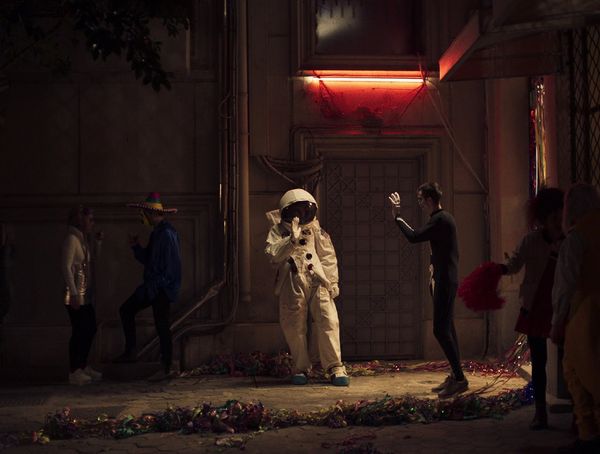In terms of Covid, Nikou admits it was a slightly surreal experience.
“It was super, super strange, especially at the beginning of the pandemic,” he says. “I remember that we were talking with my sales agent, and discussing, ‘Okay, this is a good or a bad coincidence, because how will they take it? Will they be, “Oh, we don't want to watch a movie about a pandemic?” Or maybe, “We want to watch a movie about a pandemic and realise how it works.”
He adds: “Our pandemic is totally different for sure. I mean, it's an allegory, it's something symbolic, and it's more about creating a new world to make a comment about our society and our life. But then I'm sure that it will maybe resonate with the audience more easily - they can feel and understand these hear how a pandemic works, functions also it's not so science fiction.”
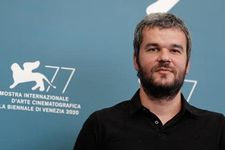 |
| Christos Nikou at Venice Film Festival, where his film opened the Horizons section Photo: Courtesy of Venice Film Festival |
There’s a sense of isolation at the core of the film and Aris’s experience – which is much more complex than it may first appear – something which our own pandemic has certainly made people more attuned to.
Nikou says: “Yes, the loss and the isolation, and maybe the uncertainty about the future and what we're doing next, I feel that all of these are elements that an audience will understand. And maybe it will be easier for them to get it. But, in the movie I try to take an optimistic approach with the ending and a comedic dramatic tone. I hope that the audience will see the subject of memory as something timeless.”
There is a strong absurdist element to the film that helps to balance a deep-seated sense of grief at other moments – moments when Nikou drew on the loss of his own father when he was writing the screenplay. It is likely to strike a chord with anyone who has suffered the loss of someone close as the film captures the way that grief can be re-encountered with the creation of new memories not just with the recollection of the old.
Nikou says: “The person is always with you. Even if you are not putting him in your memories, his absence is in your memories in the back of your mind, so it's how you can deal with this loss and how you can move on and actually accept it. That's the most important – we have to learn from the past.”
In addition to dealing with memory and loss, the film also has plenty to say about the nature of ‘influence’, with some of the selfies that the central character takes mimicking those we see on social media everyday as he recreates a sort of “constructed” self.
Nikou says: “In general, if you will think about the main actor is doing that he has that he listens something on a tape recorder then he imitates it. He takes a selfie with a Polaroid camera and then he puts the photo in an analogue photo album and it's something that exactly people are doing right now they, they imitate something that they hear, or they vote on Instagram or TikTok. They go out and they live the moment by taking a selfie, with a Polaroid filter most of the time, and then upload it in their digital photo album. Which is exactly the same, they follow the same steps. The most important is that I feel that we are living and experiencing life in a way that we care more about the photo – we take it in order to prove that we lived something in moment.”
The writer/director, whose film opened the Horizons section of Venice Film Festival last year, takes his cue from those Polaroid filters, squaring off the aspect ratio of the film to mimic the shape of the photographs, which confines Aris more within the frame.
“We wanted to do that, because first of all, it is related to Polaroid cameras. And in that way, he feels a little bit isolated in this frame all the time, because he's always all in this frame. And it’s also academy ratio, that they were using in the past and it's almost forgotten. So we also did it with that intention in mind. It's also something that, in the last 20 years, it was used more in movies that have social subjects as their topics like, for example, Andrea Arnold’s movies. It is the portrait ratio and it's not about so much about the environment or the world around. It's more about humans. It's more about people. And what we did was that we tried to give a very humanistic approach to this conceptual story - we didn't care so much about the world around him. We wanted to follow the whole journey in whole emotions, through his eyes.”
I ask if, in a sense, something about the nature of this sort of selfie culture boils down to the difference between doing the thing and living the thing?
“Exactly. Yeah. But sometimes, when he connects with his emotion and he knows that, God, he is going to do it a bit wrong, then then difficulties come with his story and his journey.”
At the hub of the film is an interrogation of the nature of memory, beyond the act of simple loss, but in the way that we can be selective in our recollections.
Nikou’s fellow film director Yorgos Lanthimos has cropped up as a reference in many of the reviews of the film but though Nikou worked as a second assistant director on Dogtooth, his film has a much warmer tone than Lanthimos’ work in general.
“Because I worked with Yorgos I feel like I’ve read it almost everywhere, this comparison,” says Nikou. But I know that even if I admire Yorgos a lot, he wasn’t at all our reference in anything when we were doing in this movie. We were trying to avoid any comparison. We wanted to make something much more tender much more. I mean, we tried to make something – I don’t know if it’s good to say it – but that is coming from me, as far as I am and that is related to my thoughts, and with my heart and with my soul.” He adds: “I don't have a problem with all the references. We are all inspired by movies or by directors. Of course, my favourite directors from the past are Bresson and Cassavetes. From recent film history, I really love all the scripts of Charlie Kaufman and the movie that wanted that made me to want to be a filmmaker was The Truman Show.
Unlike many filmmakers, Nikou didn’t go to film school – “I couldn’t afford it, because we didn’t have a public film school here in Greece”. Undeterred, he took inspiration from the fact that most of his favourite directors were self-taught.
“I realised that when you are making something in your own way, and not how they lend to you how to do it, you are more open minded to decide your own route and to understand exactly what you love, and what not what the other people lend you to love. So in that way, I was feeling very lucky that I started working in the industry as an assistant director because I wanted to learn the practical side of this work, and then to tell my own stories. Orson Welles said that what you have to learn about cinema, you can learn it in three days, then it is what you have to give to the cinema. And it's exactly this, the practical side of filmmaking is very easy to learn. The thing is what is your heart and your soul that you can give to the cinema.” Nikou’s next film Fingernails will see he and his Apples collaborator Stavros Raptis move into the English language and already has big-hitter Carey Mulligan – fresh from her [film]Promising Young Woman[/film[ Oscar nomination - attached.
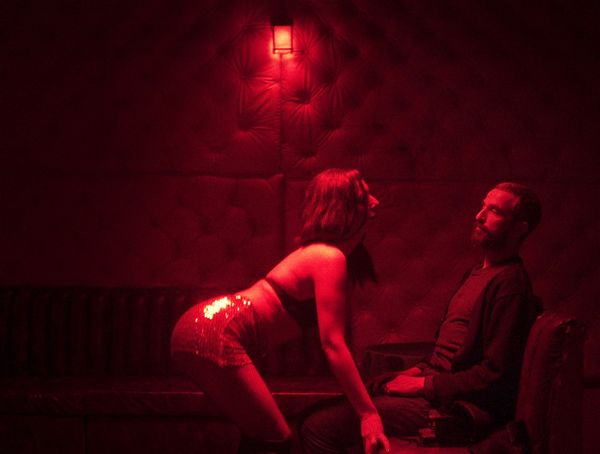 |
| I don't think that they have an answer yet about if our memory selective or not, I think that I don't know what our memory keeps Photo: Courtesy of Trigon Film |
He says: “I'm working with my co-writer from Apples and a British writer, Sam Steiner. I was introduced to him by my managers. We decided to work together immediately because we have totally the same feelings, we love the same things. And I had an idea about the story about Fingernails that we are again creating a little bit of a different world. In this world, romance and love are not in the best position, let's say, and people are struggling to fall in love. And we would like to create something that is almost the other side of the same coin of Apples. And to explore and to understand something different about life, and how our life functions in general.
“We were very lucky that because from the beginning, we had Carey Mulligan on board, she saw the treatment, and she loved it. And she also saw Apples, and she loved it. So we decided to work together. And then also Cate Blanchett was on board as a main producer. So right now we're finishing with the script and we hope that by the first three months of 2022, we will have shot the film.”
Does working in English, outside of his first language, present any problems?
“Not for me, because the language of cinema is one. I don't feel that there is a difference. For sure, my English is not the best but maybe one day I will make a movie in France or in Italian or I don't know. I mean, it doesn't matter in which language we're shooting, it's more about what story you have to tell. And I know that in English I can maybe make my dreams easier or in in a better way somehow, to work with actors that I really admire that I’ve wanted to work with my whole life. Yes, and it's an it's an exciting, new challenge.”
Apples will be released in the UK on VoD by Curzon this Friday, May 7 and it is also currently screening virtually in the US as part of New Directors/New Films








